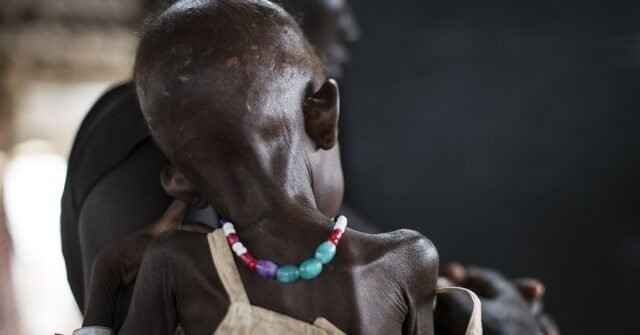The United Nations World Food Program (WFP) is reportedly investigating two of its top officials in hunger-plagued Sudan for fraud, including efforts to conceal the role of the Sudanese army in obstructing humanitarian aid.
Sources told Reuters on Wednesday that long-simmering concerns about mismanagement of the Sudan project finally sparked an investigation after portions of the Darfur region were officially classified as being subject to famine last month.
Signs of mass starvation were gruesomely obvious even before that, with gravesites blossoming faster than any harvest, and foreign reporters watching Sudanese civilians literally eat dirt to survive.
Sudan has been in the grip of a brutal civil war since 2023, when a schism in the ruling junta erupted into violence. The conflict between Sudanese army commander and de facto national ruler Gen. Abdel Fattah al-Burhan and his onetime compatriot, Rapid Support Forces (RSF) commando leader Mohamed Hamdan “Hemedti” Dagalo, appears likely to continue until one, or both, are dead.
Both sides of the conflict have committed atrocities, including brutal attacks on civilians and using starvation as a weapon. The RSF is notorious for looting humanitarian aid to feed its fighters, while Gen. al-Burhan is constantly seeking to cut supply lines to the insurgent militia, without much caring what happens to civilians who can no longer obtain food and medicine.
The food crisis in Sudan is exacerbated by the huge number of civilians displaced by fighting between al-Burhan’s and Dagalo’s forces. The International Organization for Migration (IOM) says almost 11 million people have been displaced by the civil war. About two million of those displaced persons fled across national borders. The others are struggling to survive in areas where already primitive and overtaxed infrastructure has been completely destroyed.
“We are at a breaking point, a catastrophic, cataclysmic breaking point,” the IOM warned two weeks ago.
The WFP, which won the Nobel Prize in 2020 for its efforts to combat global hunger, has identified Sudan as one of the most urgent humanitarian crises in the world. Over 25 million people in Sudan are facing acute hunger. Inflation is out of control, so even those few Sudanese who have money are coping with 200 percent annual inflation for staples like grain.
On Tuesday, which was Day 500 of the Sudanese civil war, the WFP said at least 36 million people in the region have been “hit hard by the conflict.” The WFP described the situation in Sudan as “the world’s largest hunger and displacement crisis.”
The urgency of the crisis in Sudan makes the scandal reported by Reuters on Wednesday all the more shocking:
One focus of the investigation involves suspicions that senior WFP staff in Sudan may have misled donors, including U.N. Security Council member states, by downplaying the Sudanese army’s alleged role in blocking aid deliveries to areas controlled by the RSF, according to four people with direct knowledge of the matter.
In one instance in June 2024, two people with knowledge of the probe said, WFP deputy country director [Khalid] Osman allegedly hid from donors that authorities aligned with the army in Port Sudan had refused to give permission for 15 trucks to carry life-saving aid to Nyala in South Darfur, an area that includes communities at risk of famine. The trucks waited for seven weeks before they finally were granted permission to proceed.
Osman, who was promoted within the WFP’s Sudan office with unusual speed, had high-level army connections, according to eight sources. He exercised control over which WFP colleagues gained visa approvals to enter Sudan, allowing him to limit access and scrutiny of the army’s management of aid, according to three people familiar with the system.
The other senior WFP official under investigation, Mohammed Ali, is under scrutiny for the mysterious disappearance of some 200,000 liters of fuel for WFP vehicles. The fuel vanished from Kosti, one of Sudan’s largest cities. Kosti is currently under the control of al-Burhan’s Sudanese Armed Forces (SAF), although their positions have come under frequent attack from the RSF.
The SAF ostensibly granted permission for truckloads of humanitarian aid to enter Darfur on August 15, but very few trucks have moved over the ensuing two weeks, because the al-Burhan junta created a “humanitarian aid commission” that insists on managing all such deliveries, and the commission is not moving with any sense of urgency.
Some smaller humanitarian aid groups have chosen to ignore the junta and deliver food to the starving by any means necessary, but big-ticket organizations like the U.N. World Food Program feel obliged to recognize al-Burhan’s government as the legitimate rulers of Sudan and obey their directives.
The allegations reported by Reuters imply that the WFP officials under investigation have been misleading donors about their ability to actually deliver supplies through the violence of the civil war and the bureaucratic obstacles created by the junta. The largest of those donors, by far, would be the U.S. Agency for International Development (USAID) – in other words, the American taxpayer.
USAID told Reuters it was notified by the WFP last week of “potential incidents of fraud affecting WFP operations in Sudan.” This was considerably more detail about the situation than the WFP provided in its own vague response to the Reuters piece.
“These allegations are deeply concerning and must be thoroughly investigated. USAID immediately referred these allegations to the USAID Office of the Inspector General,” the American agency said.
